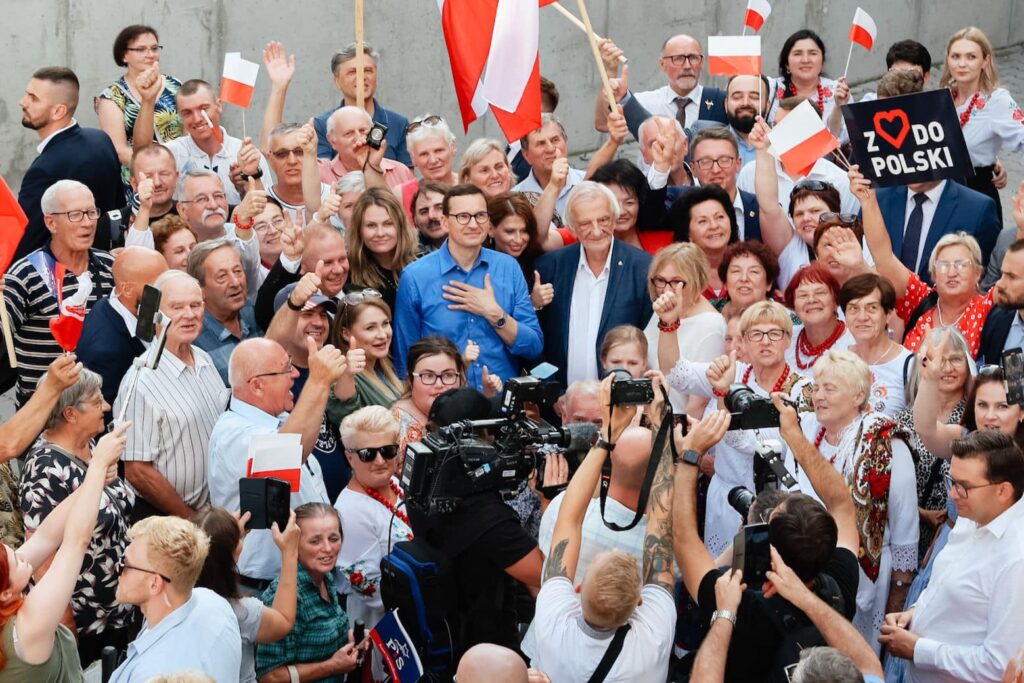
“We want Poles to decide who we want to let in, who we will let into our country” – said Prime Minister Mateusz Morawiecki in his latest recording on social media. This message delivered to Poles should also resonate strongly in Brussels, and the EU should finally begin to respect Polish democracy and democratic choices made by Poles.
In a few-minute recording posted on social media, Prime Minister Mateusz Morawiecki spoke about attacks on Poland by brutal and aggressive migrants trying to get from Belarus through Poland to Germany. He also thanked all the services that guard the security of Polish borders and all those who support them in this. Then he drew attention to the threats of illegal migration.
“Let me remind you what happened in Valencia, where a 27-year-old from Morocco destroyed the graves and – if I heard this information correctly – also desecrated the corpses. This is barbaric behavior, unfortunately also related to illegal immigration. And when we talk about it, another, an extremely sad incident in Munich, where an immigrant, probably from Afghanistan, raped our compatriot, a young man. This is an example that will be deeply etched in my memory, because over a week ago, on August 15, when I took part in a picnic on the grounds of the National Stadium, a lady came up to me, also from Munich, and she started talking about how dangerous life in the evenings is in Munich” – the head of the Polish government enumerated.
He admitted that he was happy that the woman in question wanted to return to Poland, “but it is extremely sad that this multi-cultural policy, this policy of full openness to migrants, to illegal immigrants, has led to the fact that security has been undermined in the rich countries of the West”.
“We want to live like in the West, but without all these mistakes, without all these distortions, madness, ideological revolutions that lead nowhere” – Mateusz Morawiecki emphasized. “Our anti-immigration policy leads to the fact that we want to block all illegal immigration. We want Poles to decide who we want to let into our country” – he added.
At the same time, the head of the Polish government declared that Poland would continue to support countries in need so that they would be able to meet the needs of their citizens and not become a source of illegal immigration. “Support for the development of countries that are a source of illegal immigration – absolutely yes. I have been talking about this for 6-7 years at European Councils, during various international formats in which I participated” – Morawiecki said. “Poland does not shy away from supporting African or Middle Eastern countries. We carry out dozens, if not hundreds, of various types of humanitarian activities. We also try to give a fishing rod, not just a fish, to help in economic development” – he stressed.
“Recently, I spoke with our ambassador to the UN in New York, Mr. Krzysztof Szczerski, who told me that the countries of the Middle East and African countries are also very interested in how we improved the public finance system after Civic Platform. This is also very important, because Solomon will not pour from an empty one, and we are ready to give all kinds of advice, lessons to those who ask us about it” – he declared.
“That is why we want a referendum on migration. So that Poles can express themselves how they treat the barrier with Belarus. Is it like a barrier that is supposed to actually exist, or like our competitors from the Civic Platform who would like to demolish this barrier” – he claimed.
It is worth noting at this point that the issue of accepting migrants has not been transferred to the competence of the European Union in the Lisbon Treaty, which means that no EU institution has the right to exert any pressure on Poland in this matter, not to mention extortion. It is the duty of EU officials to respect the position of the Polish government. Any other action is nothing more than lawlessness and violation of international agreements.
Anna Wiejak
